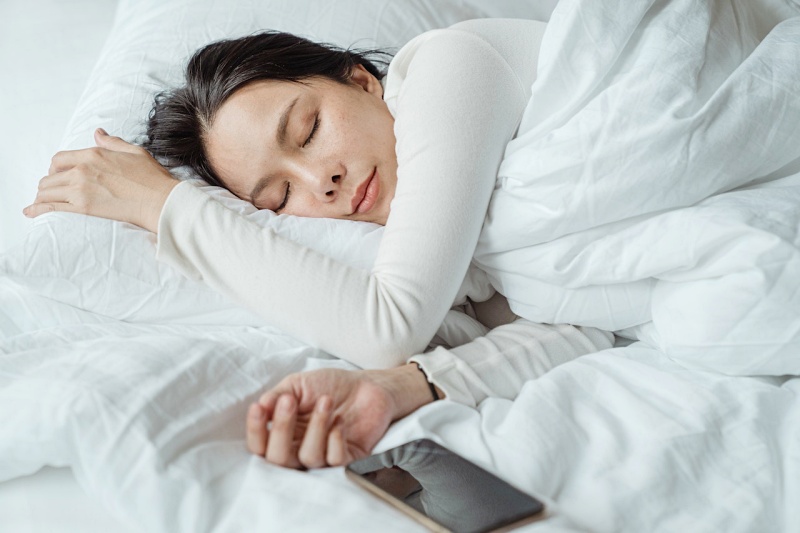If you allow TV time to overcome bedtime, you may be guilty of revenge bedtime procrastination. It’s a nightmare of a habit.
Rest easy. We’ll share practical tips to kick the bad habit and overcome revenge bedtime procrastination.
RELATED: What Is The Impact Of Sleep On Your Mental Health?
What You Need to Know About Revenge Bedtime Procrastination

What Is Revenge Bedtime Procrastination?

Revenge bedtime procrastination is when you take revenge over what little entertainment hours you have left in your day on your bedtime.
Do you climb into bed early on weekdays, but spend all night up to catch up with your favorite flicks on the weekends? Or do you indulge in your favorite hobbies after work, delaying bedtime until you feel satisfied? If you said yes, you are guilty of revenge bedtime procrastination.
People that do this often feel that they don’t have enough hours in the day to relax. As a result, they sacrifice much needed bedtime in order to catch up or regain lost play time.
How Can I Overcome Revenge Bedtime Procrastination?
1. Understand That You’re Committing Revenge Bedtime Procrastination

The first step to solving the problem is acknowledging that you have a problem and that it is a problem that needs fixing.
Overcoming revenge bedtime procrastination is doctored mostly by correcting bad habits. And overturning bad habits and adopting a new, healthy lifestyle requires heaps of willpower—a finite source.
When you’re losing motivation, remind yourself of why you’re doing this in the first place. Whether it’s to bring your body back to good health or an effort to live a healthier lifestyle, use it as a mantra and chant it to yourself once in a while.
When Prime Video or Netflix coaxes you into another episode, think back to the moment you decided to correct your sleeping habits. Or when your body is craving for a cup of caffeine late in the day, remind yourself why it’s important that you stick to your new bedtime.
Adopting a healthier and more positive mindset towards sleep can do wonders for correcting old habits. Where you may have seen sleep as a hindrance for more leisure time, you may start seeing sleep as the first step to feeling better overall—even without the additional Netflix episode.
2. Craft a Daily Routine That Balances Bedtime and You Time

Your daily routine should allow enough time for both rest and relaxation—whether it’s a weekday or weekend.
Work backwards. Decide what time you want to wakeup (weekend or weekday). And from there, calculate what time you’ll need to be in bed to get 7-8 hours of sleep.
Make sure it’s fairly reasonable and practical. If it’s not something you can stick to on both work days and rest days, it will be hard to remain consistent and you may not form the habit.
Because your daily schedule allows enough time for play time, you won’t feel the need to trim down bedtime to allow more room for leisure time. This eliminates the reason that brought about revenge bedtime procrastination in the first place.
Above all, make time for the things that matter.
In addition to allotting enough time for sleep, creating a schedule allows you to manage your time better. The optimal schedule lets you do the things you love while making sure you’re still giving your body enough love.
RELATED: Lack Of Sleep Symptoms And How To Fix Them
3. Practice Good Sleep Hygiene

In order to stick to the schedule you’ve set for yourself, you need to practice good sleep hygiene.
Everything you do during the day plays into how well you sleep at night. Sleep hygiene are a set of habits or good practices that you do before bedtime to make sure you fall asleep quickly and deeply. It includes:
- following a strict sleep schedule
- keeping your bedroom cool, dark, and quiet
- avoiding gadgets 30 minutes before bedtime
- limiting fluid intake at night
- squeezing in some physical activity during the day
- using your bed only for sleep and intimacy
- avoiding caffeine and alcohol too close to bedtime
Sleep hygiene also provides a solid foundation for cognitive behavioral therapy (CBT) for people dealing with insomnia. It encourages sleepers to manage their sleep schedule effectively and focuses on relaxing and de-stressing the mind and body.
Read more tips to fall asleep fast here.
4. Create a Relaxing Nighttime Routine

Make your nighttime routine relaxing and include things that personally soothe you—things you can really look forward to.
Take extra getting ready for bed. Light up some candles if lavender aromas help de-stress you. A warm bath could help melt your worries away and calm your mind.
Your nighttime routine could double as leisure time and a vehicle to help you sleep on schedule.
Why Is Revenge Bedtime Procrastination Bad for Your Health?

Sleep is one of the pillars of good health. Like sleep and physical activity, it allows your body to function optimally and keep your bodily processes running normally like a well-oiled machine.
And studies show that not getting enough negatively impacts your health as soon as the next morning and as far as in your golden years.
Research reveals that not getting enough sleep puts your mental and physical health at risk of:
- depression
- obesity
- high blood pressure (hypertension)
- diabetes
- heart disease
- stroke
- kidney disease
Some more immediate effects of sleep deprivation include:
- poor mood
- inability to focus
- bad memory
- poor decision making
- slower thinking
- irritability
And in older adults, sleep deficiency is linked to more accidents and broken bones.
It’s important to understand that people that commit revenge bedtime procrastination are those that sacrifice sleeping hours for play time. It may not necessarily include people that naturally sleep later in the day. Because it’s a relatively new concept in the science of sleep, it’s too soon to say that night owls are serious offenders.
The key takeaway is to avoid robbing your body of much needed rest. Sleep is integral to good health.
When we push back bedtime for a few more episodes on Netflix, we hurt our health for the next day and the decades to come.
Are you guilty and are committed to overcoming revenge bedtime procrastination? Share your thoughts with us in the comments section below! We’d love to hear from you.
UP NEXT:

























































0 Comments